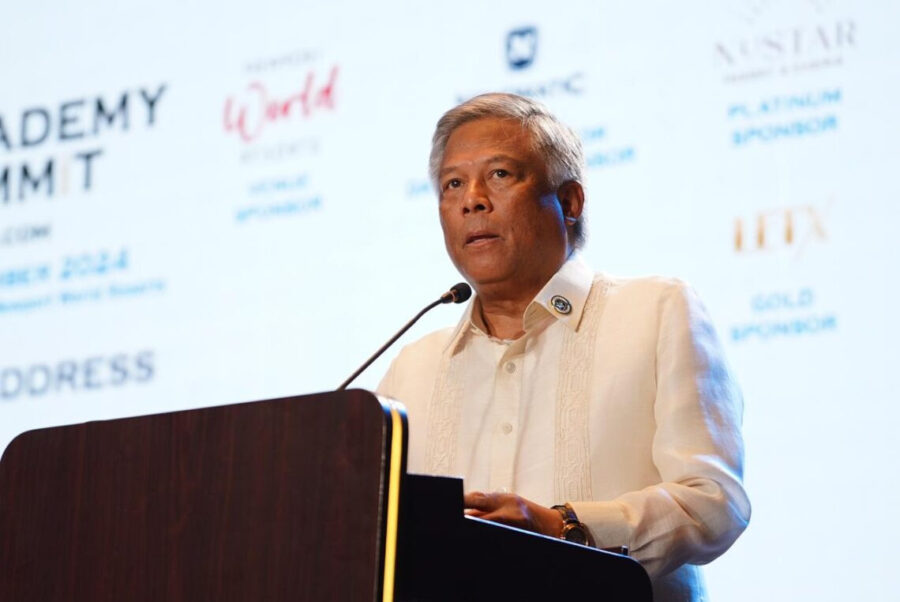Philippine government honors PAGCOR for PHP12.7 billion contribution to treasury

Philippine gambling regulator PAGCOR has received a certificate of recognition from the country’s department of finance for remitting PHP12.7 billion (US$218 million)1 PHP = 0.0171 USD
2025-10-10Powered by CMG CurrenShift in dividends to the treasury in 2024.
The award ceremony took place at Malacañan Palace in Manila last month, during the 2025 Government-Owned or Controlled Corporations Day.
PAGCOR ranked third highest in dividend remittances, following Landbank of the Philippines, which contributed PHP33.5 billion (US$574 million)1 PHP = 0.0171 USD
2025-10-10Powered by CMG CurrenShift, and Bangko Sentral ng Pilipinas, which contributed PHP18.9 billion (US$324 million)1 PHP = 0.0171 USD
2025-10-10Powered by CMG CurrenShift.
PAGCOR’s total contribution consists of a PHP8.45 billion (US$145 million)1 PHP = 0.0171 USD
2025-10-10Powered by CMG CurrenShift mandatory 50% government share from its net income, with PHP4.22 billion (US$72.4 million)1 PHP = 0.0171 USD
2025-10-10Powered by CMG CurrenShift covering a 25% advance to be applied to future obligations.
PAGCOR Chairman and Chief Executive Alejandro H. Tengco said, “This award is a meaningful affirmation of PAGCOR’s steadfast commitment to nation-building and fiscal responsibility. Each peso we generate and remit to the National Treasury reflects the dedication of our workforce and the trust placed in us by the Filipino people.”
Finance Secretary Ralph Recto commended the collective effort of government-owned or controlled corporations in supporting government priorities. Further stating, “Because of your cooperation, the government continues to improve public services without asking ordinary Filipinos to carry the burden of new taxes.”
Last month, the National Bureau of Investigation received a PHP50 million (US$857,265)1 PHP = 0.0171 USD
2025-10-10Powered by CMG CurrenShift contribution from PAGCOR to assist it in its efforts to eradicate illegal gambling.
Abi Bray brings strong researching skills to the forefront of all of her writing, whether it’s the newest slots, industry trends or the ever changing legislation across the U.S, Asia and Australia, she maintains a keen eye for detail and a passion for reporting.
Verticals:
Sectors:
Topics:
Dig Deeper
The Backstory
How PAGCOR’s record run set the stage
The Philippines’ gaming regulator is coming off its strongest year on record, a backdrop that explains both the government’s praise and its push for tighter oversight. The Philippine Amusement and Gaming Corp., or PAGCOR, booked 112 billion pesos in revenue in 2024, up 41% from the prior year and eclipsing its pre-pandemic peak, according to the agency’s year-end disclosure. Net income jumped 146% to 16.8 billion pesos as digital betting accelerated. In its review of the year, the regulator said e-games and e-bingo accounted for half of all gaming revenue, underscoring how quickly online play has moved from the margins to the center of the business. Those results, detailed in PAGCOR reports record US$1.92 billion revenue in 2024, also showed robust contributions from licensed casinos and the state-run Casino Filipino network.
That surge mattered beyond the headline numbers. PAGCOR’s charter requires it to channel earnings back to the state, and the agency said it delivered 68.2 billion pesos to nation-building in 2024, including payments to the National Treasury, franchise taxes, and remittances to sports and social programs. The composition of revenue also shifted in ways that will shape regulatory priorities: online channels became the key growth engine, while contributions from the shuttered offshore segment faded. The distribution illustrates why policymakers are now focused on the digital side of gambling.
Momentum carried into this year. In the first quarter of 2025, e-games and e-bingo generated 56% of industry revenue, lifting total take to 28.07 billion pesos and net income to 4.22 billion pesos. PAGCOR credited cost discipline and oversight improvements for the gains, according to E-gaming responsible for over half of PAGCOR first quarter revenue. The early read reinforced a central dynamic: growth is now concentrated online, raising both the rewards and the risks that regulators must balance.
Dividends, debt relief and fiscal optics
As revenues climbed, the regulator’s payouts drew notice in Manila. The Department of Finance recognized PAGCOR for remitting 12.7 billion pesos in dividends to the treasury in 2024, ranking it third among government-owned and controlled corporations, behind Land Bank of the Philippines and the central bank. The award, presented at Malacañang during GOCC Day, highlighted the agency’s contribution to fiscal space at a time when the administration is managing deficits and inflation pressures. The breakdown included an 8.45 billion peso mandatory share from net income and a 4.22 billion peso advance to be credited against future obligations, as reported in Philippine government honors PAGCOR for PHP12.7 billion contribution to treasury.
The optics matter. Officials have been explicit that stronger GOCC dividends help fund services “without asking ordinary Filipinos to carry the burden of new taxes.” That framing aligns with how the administration wants to sell reforms in the gaming sector: extract more from profitable operators while beefing up guardrails to protect consumers and the financial system. The 50 million peso grant to the National Bureau of Investigation to curb illegal gambling, noted in the same report, further tied PAGCOR’s cash flow to law enforcement and social objectives.
Regulatory screws tighten as online betting swells
Rapid growth has attracted regulatory scrutiny. The Department of Finance is weighing stricter rules for online gambling that could raise effective rates without new legislation. Options under review include higher remittances and fees for e-gaming licensees and restrictions on who can invest in the sector. The government already banned civil servants from online gambling under updated conduct rules and signaled it might bar state funds, including the Maharlika sovereign wealth fund, from exposure to the industry. These deliberations were outlined in Philippine government continues to mull stricter online gambling rules.
The policy thrust is twofold. First, to capture more revenue from a fast-expanding cohort of digital operators that benefit from scale and low marginal costs. Second, to reduce the social spillovers and financial risks tied to 24/7 mobile betting, including problem gambling and the use of e-wallets for illicit flows. The central bank is considering curbs on digital wallets for betting, according to separate regulatory discussions, a move that would directly affect how e-gaming transactions are funded and monitored.
Transparency push rattles public markets
Beyond taxes and fees, finance officials are exploring a structural lever: mandatory listings for licensed online gambling firms on the Philippine Stock Exchange. The proposal aims to force disclosure of beneficial owners, financials and risk factors, improving oversight and investor protection. In Philippine government considers mandatory stock exchange listing for igaming firms, Finance Secretary Ralph Recto said regulators are also evaluating higher remittance rates that could add about 10 billion pesos in annual revenue.
The market response was swift. Shares of DigiPlus Interactive, operator of BingoPlus, ArenaPlus and GameZone, slumped 30% in a single session amid the drumbeat of potential rule changes, while Bloomberry Resorts, which recently launched MegaFUNalo, fell 5.62%. The selloff underscored investor uncertainty over the cost of compliance, the sustainability of promotion-led growth in e-gaming and the durability of wallet-based funding if payments rules tighten. Industry players have voiced support for “balanced” regulation, but the proposed listing mandate would reset disclosure and capital requirements across the board, likely favoring better-capitalized incumbents and squeezing smaller operators.
Legislators are moving in parallel. A bill filed by Sen. Sherwin Gatchalian would toughen controls on e-games, signaling bipartisan appetite for a higher bar on licensing, consumer protection and anti-money laundering safeguards. Coordination among PAGCOR, the finance department, the central bank and Congress points to a multi-pronged regulatory reset if the proposals advance.
Enforcement and the fight against fraud
With more money online, scams are proliferating. PAGCOR recently issued a nationwide warning about a fraudulent website purporting to issue licenses and accreditations using forged documents and signatures. The regulator stressed that its only legitimate domain is pagcor.ph and referred the case to the Department of Information and Communications Technology for investigation and prosecution. The alert, detailed in PAGCOR issues nationwide warning over scam website, illustrates the enforcement challenge as bad actors exploit the credibility of the regulator to target would-be operators and consumers.
For policymakers, the episode bolsters the case for tighter KYC standards, clearer public registries of licensees and faster takedowns of spoofed sites. It also reinforces the argument for transparency measures, including potential public listings, to distinguish legitimate operators from fronts for illegal gambling or fraud. The stakes are high: if scams persist, public trust erodes and the political space for the industry narrows.
The stakes: growth dividends vs. political risk
The government’s recognition of PAGCOR’s dividend remittances and the agency’s record earnings tell a story of fiscal upside when gaming thrives. But 2024’s windfall has also sharpened the focus on who benefits and who bears the costs of online betting’s expansion. Finance officials see room to extract more revenue and to harden safeguards without waiting for new laws, a strategy that could move quickly. Markets, meanwhile, are repricing the sector’s risk as compliance burdens and disclosure requirements loom.
For PAGCOR, the balancing act will define the next phase. Sustaining growth in e-games while meeting more stringent oversight will require investments in monitoring, responsible gaming and payments controls, even as contributions to the treasury rise. The first-quarter results suggest momentum remains intact. Whether that continues will hinge on how far the transparency push goes, how steep the new fee and remittance schedules become, and how effectively the state polices fraud and illegal gambling in a digital-first market.







